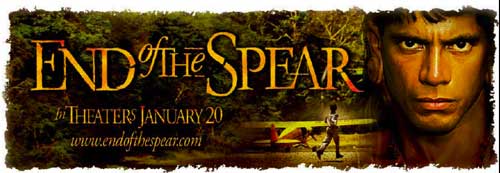
When I began my freshman year of college a movie was
released called End of the Spear. This movie is about the truth story of 5
missionaries; all who wanted to live out God’s will to witness to the Waodani,
a tribe living in the jungles of Ecuador. The story begins with the
missionaries, Jim Elliot being one of them, attempting to find the tribe. The 5
men do finally make contact with the tribe after flying into the area of the
jungle the tribe lives in. The missionaries are excited and encouraged that they
have made the first steps in witnessing to this tribe. However, this is where
the story takes a sad turn. Several of the tribesmen who were the first to come
among the missionaries misunderstood the purpose of these men. Due to the
tribe’s belief that all foreigners were cannibals, they killed all 5 of the
missionaries.
While the death of these men was a devastating tragic for
the families, something unthinkable and amazing was about to take place. After
learning of their husband’s death, the wives made the decision to live among
the tribe in order to share the Gospel. Even among their grief they heard and
obeyed God’s calling to give forgiveness and reach out to the same people who
killed their husbands. They succeed in making a connection with the tribe members.
Through that connection the women transformed the lives of tribe by showing
them forgiveness for the murder of their husbands. From seeing the forgiveness
that can only come from God, the members of the tribe gave over their lives to
Christ, which changed the course of the tribe forever.
Click here for the movie trailer.
For the last few weeks I have been reading a book written by
Dr. Larry Crabb, called Connecting. The idea behind this book is a different approach
to healing. Dr. Crabb’s belief that pain of the deepest kind can be healed
through connection, intimacy, and building a true community with others. Mankind
was not meant to go through this world alone, we are meant to have relationships
and connections. In his book Dr. Crabb listed what he believes are three
elements that are needed in order to connect and in turn find healing through
that connection. 1. A taste of Christ delighting
in us. 2. A diligent search for what is good. 3. An engaging exposure of what
is bad or painful. As I was reading this book, I could not get the story of the
End of the Spear out of my mind. The women whose husbands had been killed had
every right to hate the Waodani tribe, and no one would blame them. However
these women chose to show the tribe a taste of Christ. These women, who had
been forgiven by the death of a man who was innocent, decided to show
forgiveness for the death of their husbands. They made a diligent search for
the good in the Waodani people by living among them. And through the connection
these women made with the tribe they exposed the pain from the death of 5 men
cause by fear and lies. That connection and forgiven not only changed the
Waodani people, but help the wives to heal from one of the most painful
experience any one can go through. While this movie is a bit older so it may be
harder to find, it is very much worth the search. The story of the End of the
Spear is a story of how powerful connecting can be. How the forgiveness and the
love that Christ shown us by dying on the cross can change even the hardest of
hearts.
Your point here is so true and so challenging. It reminded me of the life of Corrie Ten Boom and her family. She obeyed God's calling and hid Jews in her home during WWII. The result of this was the death of her father and sister, and Corrie being sent to a concentration camp. What is marvelous about Corrie's story, like that of the "End of the Spear," is that after WWII was over she went back to Germany to minister to the people there. She was even confronted by a former concentration guard who sought her forgiveness. She declares that through God's help alone was she able to forgive. Her life, like Jim Elliot's, is an encouraging challenge to give "connection" to others relying fully on God's power in your life. You can read about Corrie Ten Boom in her book "The Hiding Place."
ReplyDelete